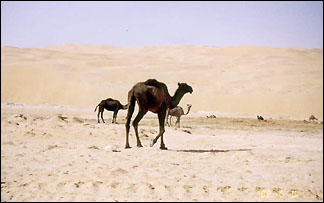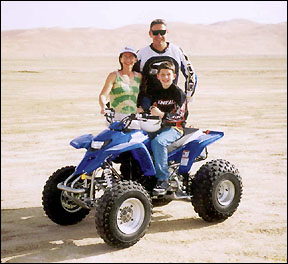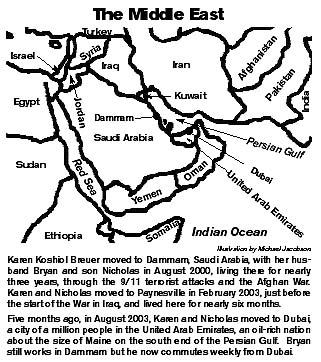Living in the Middle East - Part I
 Their family moved from Phoenix, Ariz., to Dammam, Saudi Arabia, in August 2000. Karen and Nicholas lived in Saudi Arabia for nearly three years, leaving in February 2003, just before the start of the War in Iraq. They lived in Paynesville for nearly six months while Bryan continued to live and work in Saudi Arabia.
Their family moved from Phoenix, Ariz., to Dammam, Saudi Arabia, in August 2000. Karen and Nicholas lived in Saudi Arabia for nearly three years, leaving in February 2003, just before the start of the War in Iraq. They lived in Paynesville for nearly six months while Bryan continued to live and work in Saudi Arabia.
Camels roamed the deserts of Saudi Arabia.
Karen and Nicholas were relocated to Dubai, United Arab Emirates, in August 2003 and have now lived in the Middle East again for five months. Bryan still works in Dammam, Saudi Arabia, but he flies to Saudi every week and returns to Dubai on weekends.
Karen, who graduated from Paynesville High School in 1973, is the daughter of Milt and Rosemary Koshiol of Paynesville. Again she has shared aspects of their life in the Middle East with the Press via e-mail. (To read Karen's article from November 2001, go online to www.paynesvillearea.com/news/saudikoshiol/saudiarabiakoshiol.htm.)
1. How have attitudes changed
in Saudi Arabia since 9/11?
Living on a compound, segregated from the local Saudi community, it is difficult to get an accurate picture on attitudes towards Americans. It seems that people in the local shops were somewhat more silent towards us. More blatantly, there had been instances outside the compound on shopping trips where some of the ladies were spat at or had things thrown at their bus.
 Otherwise, compound life was very much as it was before September 11 and the Afghan and Iraq wars with the exception of one significant difference: the expatriate schools lost over a third of their enrollment due to families leaving Saudi.
Otherwise, compound life was very much as it was before September 11 and the Afghan and Iraq wars with the exception of one significant difference: the expatriate schools lost over a third of their enrollment due to families leaving Saudi.
We still read Letters to the Editor giving us a general feel for local attitude towards westerners.
Karen Koshiol Breuer, Bryan Breuer, and Nicholas Breur enjoy the desert in the United Arab Emirates by spending a day four-wheeling.
Immediately after 9/11, many Saudis were sympathetic towards Americans due to the fact there has been at least 50 years of mutual cooperation, friendship and peace between America and Saudi Arabia. But after the Iraq War, local attitudes seemed to change. There were many more letters which expressed contempt for the United States and criticized the U.S.'s foreign policy.
2. How did these attitude changes
affect you and your family as Americans
living in Saudi Arabia?
The changing attitudes didn't affect us greatly because we didn't have regular contact with locals except while out shopping. During this time, we women shopped more infrequently, never shopped alone, and were aware of our surroundings. We would often wear the Saudi scarf covering our hair, along with always wearing the black robe (abaya) that Saudi women must wear as to not draw attention to ourselves. A few American women covered their entire faces with the veil, but that was not common.
Overall, our lives didn't change much except we were extra aware of anyone we encountered while off the compound. After 9/11, Little League baseball continued, school was kept open, the U.S. Consulate remained open, and everything remained normal and quiet.
From a business point of view, my husband saw a difference in the business relationships between U.S. companies and Saudi professionals. He says attitudes changed in a way that greatly impacted American business in Saudi Arabia. Many Arabs/Muslims were no longer willing to travel to the United States out of fear of harassment. And because of this fear, some Middle East businesses moved their business to Europe.
3. What safety concerns did you have while living in Saudi Arabia? How did these change during your time there?
While living in Saudi, we were mostly concerned with car bombs and random attacks. Our safety precautions while in Saudi remained essentially the same throughout our stay there, although we practiced them more rigorously after 9/11.
Since our arrival in Saudi Arabia in 2000, we had been warned by the U.S. Embassy to be suspicious of mail and people following us, to respect local customs, and to check our cars for bombs. After 9/11, we were additionally advised to stay on the compound as much as possible, to stay away from mosques during/after prayer time, travel in small numbers, to leave more than one car-space in front of us while stopped at a stoplight, to try not to "dress" like an American, and not to frequent the same camping or hiking spot in the desert week after week.
The warnings came so often it was almost like having tornado warnings go off every day. The danger is that people start to get used to them and not take them as seriously as they should.
After the compound bombings in Riyadh in May 2003, security in Saudi Arabia changed drastically, especially at all housing communities. My son and I were in the United States by then, but my husband and friends still lived in Saudi and talked of how security around our compound changed tremendously.
The compound now has many checkpoints to go through before a person can enter it. There are concrete barriers around entire city blocks, along with patrols of Saudi National Guard troops. There are many more guards with more guns, roving patrols, 60-caliber machine gun emplacements, and everything is camouflaged. A city road was blocked off that went through our compound, and all cars are searched, even residents' vehicles. Everyone must show proper identification to get onto the compound.
There are also checkpoints throughout the whole city where soldiers or police officers check passports, visas, and other important papers. It is far more time-consuming and more difficult to get into any compound or to get anywhere in the city, especially to the American school or the U.S. Consulate, but the security measures are absolutely necessary.
 When my son and I went back to Saudi in August 2003 to pack up the house, I'll never forget the eerie feeling the new security measures gave me. Seeing the concrete barriers, the machine gun nests with guns pointing at us felt surreal. Gaining entrance to the compound was so different. The compound resembled a fortress. Whereas prior to the May bombings, and even after 9/11 and the Afghan War, (since security was always strict in Saudi Arabia), those earlier security measures were mainly unintrusive once we got used to them.
When my son and I went back to Saudi in August 2003 to pack up the house, I'll never forget the eerie feeling the new security measures gave me. Seeing the concrete barriers, the machine gun nests with guns pointing at us felt surreal. Gaining entrance to the compound was so different. The compound resembled a fortress. Whereas prior to the May bombings, and even after 9/11 and the Afghan War, (since security was always strict in Saudi Arabia), those earlier security measures were mainly unintrusive once we got used to them.
4. Why did you decide to leave Saudi Arabia with your son prior to the Iraq War?
My husband's company decided all non-essential employees and dependents had to depart Saudi Arabia. It started in February 2003, when my husband, Bryan, our son, Nicholas, and I were in Spain, accompanying Bryan on a business trip. On the day of departure, Bryan received the evacuation notice. My son and I were actually in a taxi, enroute to the Barcelona airport to return to Saudi when the taxi driver received a phone call from our hotel telling him to bring us back for an emergency phone call.
When we returned to the hotel, my husband was on the line explaining the notice to depart the Middle East immediately. At that time, we were also told we could not fly back to Saudi Arabia to get our things. It was a tense day, and for the time being, we stayed at the hotel until further notice.
Within hours that day, Honeywell decided we could return to Saudi Arabia to tie up loose ends and pack. So a day later, we flew back to Saudi, packed what we needed, and Nicholas and I departed Saudi Arabia at the end of February 2003. It turned out to be a good experience for Nicholas and me to live in Paynesville, my hometown again, because Nicholas was able to enroll in the public school, join baseball, see his grandparents and relatives on a regular basis, enjoy winter, live in a small town and, meet some great friends. He wants to say hello to Matt, Dillan, Connor, Justin, Dustin, Michael, Cody, Mark, Jordan, Brandon, and all the buddies he met, and he looks forward to seeing them every summer.
5. Why did your husband stay
in Saudi Arabia when you
left last February?
Bryan stayed in Saudi because the U.S. Embassy deemed the country to be safe for American businesses to remain open. Of course, it was strongly recommended that Americans continue to be vigilant and follow all security procedures. We also thought it would be a temporary departure for us and didn't think Bryan would be living in Saudi alone for six months.
Not knowing when or if the Iraq War would start, my son and I were hoping to go back to Saudi after a couple months, as moving with such short notice was a difficult adjustment to make. Taking Nicholas out of the school he had attended for grades 3-5, leaving his friends, our home of three years, a husband/father, and our two cats, and living out of suitcases was hard to do and quite a whirlwind. That all changed, of course, after the compound bombings in May 2003. After that, I no longer wished to go back to Saudi for safety reasons, and we continued our stay in the states until August 2003.
Part II (01/28/04) -- Part III (02/4/04)
(Edited by Michael Jacobson)
Contact the author at editor@paynesvillepress.com • Return to News Menu
Home | Marketplace | Community